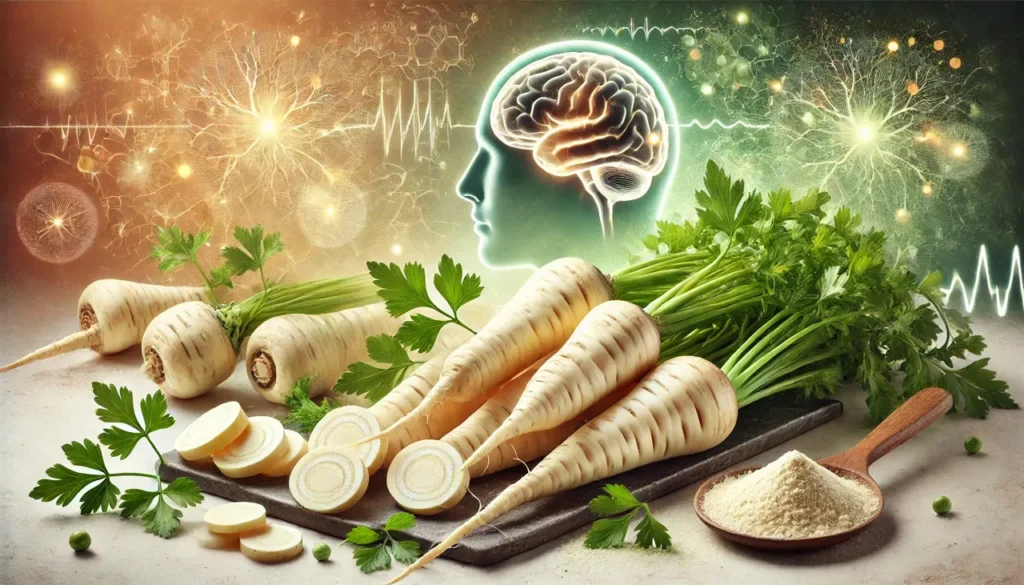Parsnip (Pastinaca sativa), a root vegetable belonging to the Apiaceae family, has been cultivated and consumed for centuries due to its rich nutritional profile and numerous health benefits. While traditionally used for its high fiber and nutrient content, parsnip is now gaining attention in the nootropic community for its potential to support brain health and cognitive function. This article delves into the science behind parsnip’s nootropic properties, discussing its bioactive compounds, mechanisms of action, dosage, side effects, interactions with other supplements and medications, and safety considerations.
Sources of Parsnip
Parsnip is native to Eurasia and has been a staple in diets for many centuries. It grows well in temperate climates and is commonly found in Europe, North America, and parts of Asia. The root of the plant is typically consumed either raw or cooked, and it is particularly rich in vitamins, minerals, and antioxidants. In terms of its potential as a nootropic supplement, parsnip contains several bioactive compounds that could benefit cognitive health:
- Vitamins: Parsnip is a good source of vitamin C, vitamin K, and folate (vitamin B9). These vitamins are critical for brain function and neural development.
- Minerals: Parsnip is rich in potassium, magnesium, and manganese—minerals essential for maintaining brain health and regulating neurotransmitter function.
- Antioxidants: Parsnips contain polyacetylenes, including falcarindiol, falcarinol, and panaxynol, which are known for their anti-inflammatory and antioxidant properties, potentially offering neuroprotective benefits.
Parsnip is consumed primarily through diet, but extracts of its root and seeds are being explored as supplements for enhancing cognitive function.
Discover the Science of Better Sleep with Expertly Formulated Supplements—Buy Now on Amazon!

Chemistry of Parsnip
The bioactive compounds in parsnip make it a promising candidate for cognitive enhancement. Key chemical constituents of parsnip include:
- Polyacetylenes: These compounds, particularly falcarindiol and falcarinol, have been studied for their anti-inflammatory and neuroprotective properties. They may protect neurons from oxidative stress, a major contributor to cognitive decline and neurodegenerative diseases.
- Folate (Vitamin B9): Folate plays a key role in the synthesis of neurotransmitters such as serotonin, dopamine, and norepinephrine. Deficiencies in folate have been associated with cognitive decline and depression.
- Potassium: This essential mineral is crucial for maintaining healthy brain function by supporting neurotransmission and regulating electrical activity in the brain. Potassium deficiency has been linked to mental fatigue and confusion.
- Soluble and insoluble fiber: Parsnips are high in fiber, which can help regulate blood sugar levels and ensure a stable supply of glucose to the brain, supporting sustained mental energy.
These compounds contribute to parsnip’s neuroprotective effects, making it a potential addition to nootropic regimens focused on brain health and cognitive longevity.

Physiological Mechanisms of Parsnip in the Body and Brain
Parsnip influences brain health through several physiological mechanisms, primarily centered on its role in reducing inflammation and oxidative stress, as well as promoting neurotransmitter synthesis.
- Antioxidant Activity: Parsnip’s polyacetylenes, such as falcarinol and falcarindiol, have demonstrated potent antioxidant effects that help to neutralize free radicals in the body. Oxidative stress is a major factor in neurodegenerative diseases such as Alzheimer’s and Parkinson’s, and the regular consumption of antioxidants can help mitigate this damage.
- Folate and Neurotransmitter Synthesis: Folate is essential for the production of neurotransmitters such as serotonin and dopamine, which are critical for mood regulation, memory, and learning. Folate deficiency can impair cognitive function and increase the risk of mental health disorders, including depression and cognitive decline. By ensuring sufficient folate intake, parsnip may support overall brain function and improve cognitive resilience.
- Regulation of Brain Energy: Potassium is necessary for maintaining the electrical potential across neuron membranes. A stable supply of potassium supports cognitive processes such as focus, learning, and memory and prevents mental fatigue by ensuring neurons remain optimally charged.
- Anti-inflammatory Properties: Chronic inflammation has been implicated in cognitive decline and the onset of neurodegenerative diseases. The polyacetylenes in parsnip act as anti-inflammatory agents, potentially reducing neuroinflammation that can lead to cognitive impairment.
- Blood Sugar Regulation: The fiber content in parsnip aids in maintaining stable blood sugar levels, which is important for brain health since glucose is the primary energy source for the brain. Fluctuations in blood sugar levels can lead to mental fog, irritability, and impaired cognitive function.
Support Healthy Hair Growth and Scalp Vitality with Premium Supplements—Order Today on Amazon!

Nootropic Benefits of Parsnip
Parsnip’s nutritional profile suggests several cognitive benefits that make it a potential nootropic. These benefits are primarily attributed to its ability to support brain metabolism, protect against oxidative stress, and promote neurotransmitter function.
- Memory Enhancement: The folate content in parsnip is crucial for the production of neurotransmitters that play a role in memory formation and retention. Adequate folate levels may improve long-term and short-term memory by supporting the synthesis of acetylcholine, a neurotransmitter critical for learning and memory.
- Cognitive Clarity and Focus: The combination of potassium and antioxidants in parsnip may contribute to improved cognitive clarity and focus. Potassium’s role in maintaining neuronal charge helps sustain attention and focus, while antioxidants reduce oxidative stress, preserving cognitive function.
- Neuroprotection: Parsnip’s anti-inflammatory and antioxidant compounds offer protection against neurodegenerative diseases by preventing oxidative damage to brain cells. Regular consumption of antioxidants has been linked to a reduced risk of cognitive decline, making parsnip a valuable addition to a brain-healthy diet.
- Mood Regulation: Folate in parsnip supports the production of serotonin, a neurotransmitter linked to mood regulation and mental well-being. Deficiencies in folate are associated with mood disorders such as depression, and ensuring adequate intake may improve mood stability.
- Enhanced Learning Ability: By promoting neurotransmitter synthesis, parsnip may enhance synaptic plasticity—the brain’s ability to form new neural connections, which is essential for learning and adaptation. This is particularly important for individuals engaged in academic or mentally demanding activities.
- Energy Metabolism in the Brain: Parsnip’s fiber content helps maintain stable blood sugar levels, providing a steady supply of glucose to the brain. This supports sustained cognitive performance, especially during extended periods of concentration or mental exertion.
- Reduced Risk of Cognitive Decline: The combination of antioxidants, folate, and potassium in parsnip contributes to its ability to protect against cognitive decline, particularly in older adults. These compounds may help slow the progression of age-related cognitive disorders by maintaining overall brain health.

Dosage and Supplementation Guidelines
While parsnip is commonly consumed as a food, its potential as a nootropic supplement is still being explored. As such, there are no established dosage guidelines for its use specifically for cognitive enhancement. However, based on its nutritional composition, some general recommendations can be made:
- General Nootropic Dosage: If using parsnip as part of a balanced diet, consuming around 100-200 grams of cooked parsnip daily may provide adequate levels of its bioactive compounds, including folate and potassium, to support cognitive health. As a supplement, parsnip extracts should be standardized to key compounds such as polyacetylenes, and doses ranging from 250-500 mg of extract may offer nootropic benefits.
- Supplement Forms: Parsnip supplements are available in the form of dried root powder, extracts, and capsules. Choosing a supplement that contains standardized amounts of polyacetylenes or folate is recommended for consistent cognitive effects.
- Dietary Integration: Incorporating parsnip into meals is a safe and effective way to consume its nutrients. Steaming or roasting parsnips helps retain their vitamins and minerals, ensuring optimal nutrient intake.
Recharge Your Mental Resilience with Trusted Stress Relief Supplements—Buy Today on Amazon!

Side Effects and Safety
Parsnip is generally safe for consumption, with minimal side effects reported when used in dietary amounts. However, certain precautions should be considered, particularly when consumed in supplement form or at high doses.
- Photosensitivity: Parsnip contains furocoumarins, compounds that can make the skin more sensitive to sunlight. In rare cases, consuming large amounts of raw parsnip or handling the plant may lead to skin irritation or photodermatitis when exposed to UV light.
- Allergic Reactions: Although rare, some individuals may be allergic to parsnip, particularly those with sensitivities to related plants such as celery or carrots. Symptoms of an allergic reaction may include itching, swelling, or difficulty breathing.
- Gastrointestinal Discomfort: As with any high-fiber food, consuming excessive amounts of parsnip can lead to gastrointestinal discomfort, including bloating or gas.
Interactions with Other Supplements and Medications
While parsnip is typically safe to consume, it may interact with certain medications or supplements, particularly those affecting blood sugar, neurotransmitter systems, or photosensitivity.
- Blood Sugar Medications: Parsnip’s high fiber content may affect blood sugar levels, potentially enhancing the effects of antidiabetic medications. Individuals taking insulin or other medications for diabetes should monitor their blood sugar closely when consuming large amounts of parsnip.
- Photosensitizing Drugs: Parsnip contains furocoumarins, which can increase sensitivity to sunlight. Individuals taking photosensitizing drugs, such as certain antibiotics (e.g., tetracyclines) or diuretics, should use caution and avoid excessive sun exposure after consuming parsnip.
- Antidepressants: Folate plays a role in neurotransmitter synthesis, and parsnip’s high folate content may enhance the effects of antidepressant medications. While this interaction is generally positive, individuals taking antidepressants should consult their healthcare provider before significantly increasing their folate intake through supplements.
Risks for Individuals with Certain Health Conditions
Although parsnip is safe for most people, certain health conditions may warrant caution.
- Kidney Disease: Parsnip is high in potassium, and individuals with kidney disease may need to limit their potassium intake to avoid hyperkalemia, a condition where potassium levels in the blood become too high.
- Gastrointestinal Disorders: Due to its high fiber content, individuals with gastrointestinal disorders such as irritable bowel syndrome (IBS) or inflammatory bowel disease (IBD) should consume parsnip in moderation to avoid exacerbating symptoms.
Promote Learning, Retention, and Mental Clarity with Premium Bacopa Monnieri—Buy Now on Amazon!

Conclusion: Should You Consider Parsnip as a Nootropic?
Parsnip’s rich nutritional profile, including its antioxidants, folate, and potassium, makes it a promising addition to a brain-healthy diet. While research on parsnip as a nootropic is still emerging, its role in supporting memory, cognitive clarity, and neuroprotection is supported by its bioactive compounds. As with any supplement, it is important to consult with a healthcare professional before integrating parsnip into a nootropic regimen, especially for individuals with underlying health conditions or those taking medications that may interact with its bioactive components.
Incorporating parsnip into the diet offers a safe and effective way to benefit from its cognitive-enhancing properties, and supplementation may be a useful option for individuals seeking targeted brain health support.

References:
- Review of Pharmacological Properties and Chemical Constituents of Pastinaca sativa. Retrieved from: https://pmc.ncbi.nlm.nih.gov/articles/PMC8010426/
- Parsnip. Retrieved from: https://www.rxlist.com/supplements/parsnip.htm
- The Parsnip (Pastinaca sativa L), A Proposed Remedy as to a Fertile Agent in the Viewpoint of Iranian Traditional Medicine. Retrieved from: https://pubmed.ncbi.nlm.nih.gov/31429690/
Important Note: The information contained in this article is for general informational purposes only, and should not be construed as health or medical advice, nor is it intended to diagnose, prevent, treat, or cure any disease or health condition. Before embarking on any diet, fitness regimen, or program of nutritional supplementation, it is advisable to consult your healthcare professional in order to determine its safety and probable efficacy in terms of your individual state of health.
Regarding Nutritional Supplements Or Other Non-Prescription Health Products: If any nutritional supplements or other non-prescription health products are mentioned in the foregoing article, any claims or statements made about them have not been evaluated by the U.S. Food and Drug Administration, and such nutritional supplements or other health products are not intended to diagnose, treat, cure, or prevent any disease.


